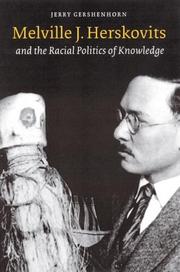| Listing 1 - 1 of 1 |
Sort by
|

ISBN: 1280424117 9786610424115 0803203950 9780803203952 0803221878 9780803221871 9781280424113 661042411X Year: 2004 Publisher: Lincoln University of Nebraska Press
Abstract | Keywords | Export | Availability | Bookmark
 Loading...
Loading...Choose an application
- Reference Manager
- EndNote
- RefWorks (Direct export to RefWorks)
"Melville J. Herskovits and the Racial Politics of Knowledge is the first full-scale biography of the trailblazing anthropologist of African and African American cultures. Born into a world of racial hierarchy, Melville J. Herskovits (1895-1963) employed physical anthropology and ethnographyy to undermine racist and hierarchical ways of thinking about humanity and to underscore the value of cultural diversity. His research in West Africa, the West Indies, and South America documented the far-reaching influence of African cultures in the Americas. He founded the first major interdisciplinary American program in African studies in 1948 at Northwestern University, and his controversial classic The Myth of the Negro past delineated African cultural influences on American blacks and showcased the vibrancy of African American culture. He also helped forge the concept of cultural relativism, particularly in his book Man and His Works. While Herskovits promoted African and African American studies, he criticized some activist black scholars, most notably Carter G. Woodson and W.E.B. Du Bois, whom he considered propagandists because of their social reform orientation." "After World War II, Herskovits became an outspoken public figure, advocating African independence and attacking American policymakers who treated Africa as an object of Cold War strategy. Drawing extensively on Herskovits's private papers and published works, Jerry Gershenhorn's biography recognizes Herskovits's many contributions and discusses the complex consequences of his conclusions, methodologies, and relations with African American scholars."--Jacket.
Self-determination, National --- African diaspora. --- Cultural relativism --- Racism in anthropology --- African Americans --- Anthropologists --- National self-determination --- Nationalism --- Nation-state --- Nationalities, Principle of --- Sovereignty --- Black diaspora --- Diaspora, African --- Human geography --- Africans --- Relativism, Cultural --- Ethnology --- Ethnopsychology --- Relativity --- Anthropology --- Scientists --- Social life and customs. --- Anthropometry. --- Migrations --- Herskovits, Melville J. --- Africa, West --- Transatlantic slave trade
| Listing 1 - 1 of 1 |
Sort by
|

 Search
Search Feedback
Feedback About
About Help
Help News
News